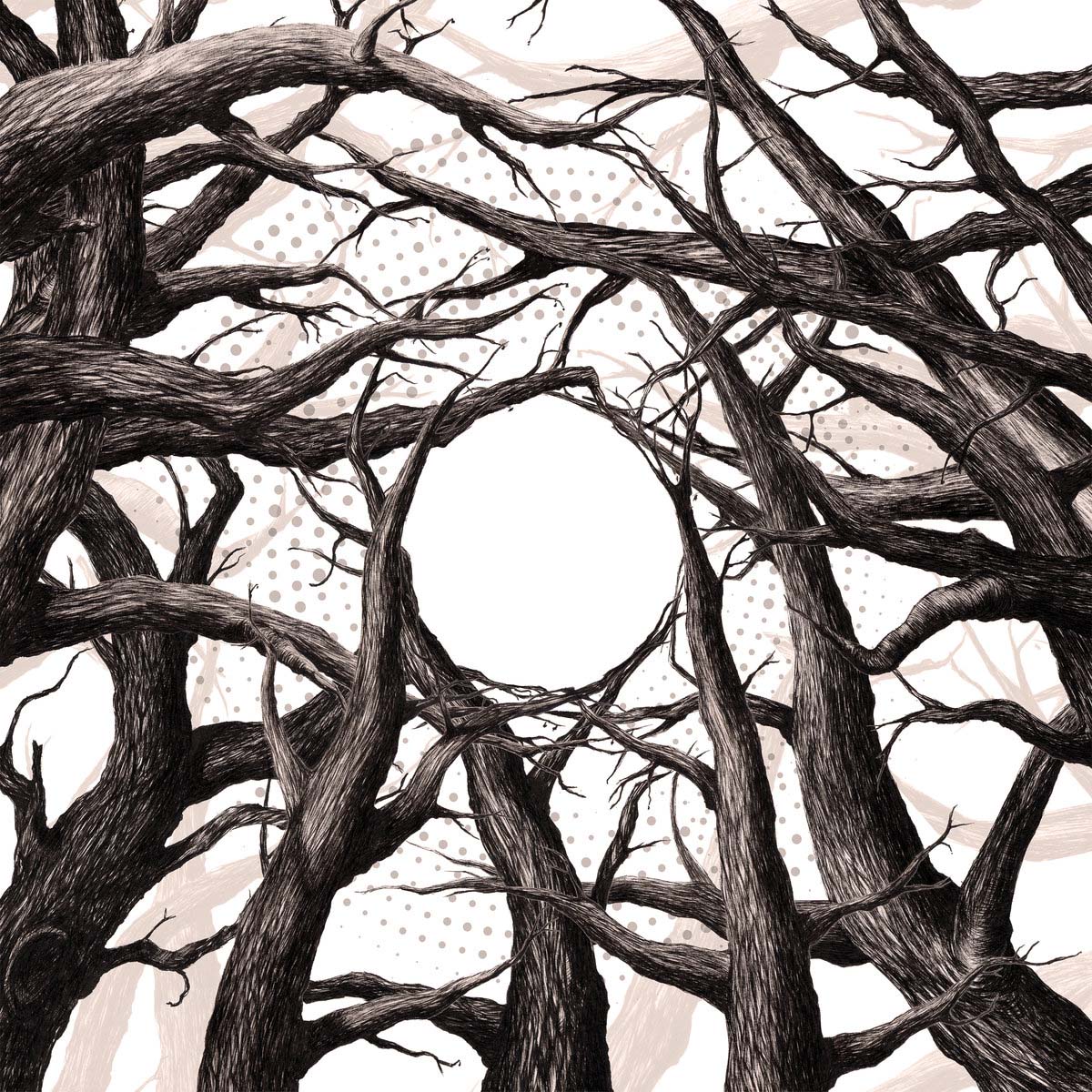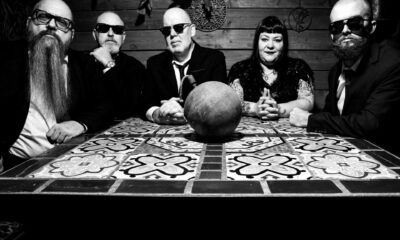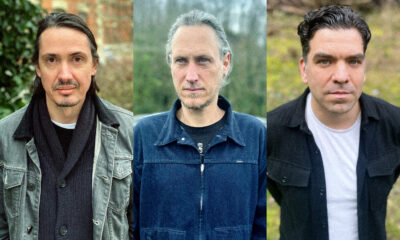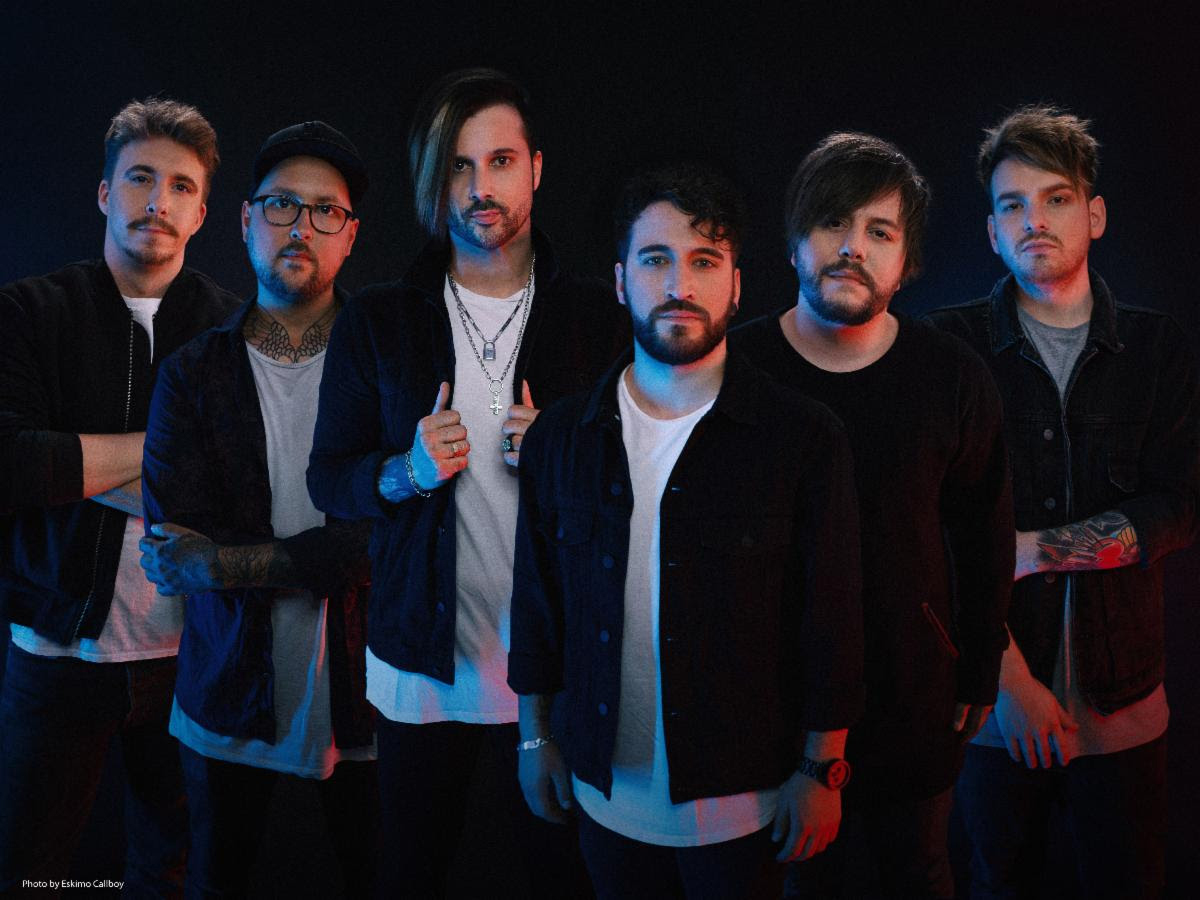Interviews
Hacks and Half-Stacks: An Interview with SVALBARD’s Serena Cherry
With their sophomore album It’s Hard to Have Hope due out May 25th via Translation Loss, Holy Roar, and Tokyo Jupiter, it was high time we caught up with Bristol, UK heavies Svalbard.

You know how music journalists will use the “full disclosure” disclaimer as a method to backstop everything from a potential conflict of interest and influence peddling to friendships and as a safety net against potential embarrassing listening habits? Well, there’s going to be none of that here. So, when I bring up how I used to be in a band (which shall remain nameless) and how said band often took advantage of the contacts I established during my prolific work as a hack while simultaneously suffering because of my sharp tongue and poison pen, think of that as “partial disclosure” and all the disclosure you’re going to get.
Serena Cherry is the guitarist/co-vocalist in Bristol’s Svalbard and these days she’s experiencing much of the same shit I experienced back in the late 90’s/early 00’s. More partial disclosure: while Serena and I have never met, we do write for a couple of the same publications and she’s a colleague whose work I always enjoy reading. Not only are her features and reviews well-done, witty and to the point, she rarely holds back on her opinions, a trait I share, know well and admire. Svalbard’s second album is set for release on May 25th via three labels; Translation Loss, Holy Roar and Tokyo Jupiter. It’s entitled It’s Hard to Have Hope and given the similarity of our stories as journalists who are/were also musicians, I figured a conversation on the topic would be interesting, if not entertaining. At least for the two of us, anyway.
I really hate asking the band history question, but sometimes it has to be asked. So, what can you tell us about Svalbard’s history?
Serena Cherry: Basically, the three founding members, myself, [guitarist/vocalist] Liam [Phelan] and [drummer] Mark [Lilley] all met at a rehearsal studio when we were playing in other shittier bands and we had a sneaky little jam and that was basically how Svalbard was born, which happened in 2011. We went through exactly 5,000 different bass players and now Adam [Parrish] is playing with us.
Check out a slick sample of the new material via the single “Revenge Porn”.
When you decided to do that jam together, was there a direction you’d decided on at the time?
Cherry: Not specifically, which was what I think was so good about it. All of our previous bands were a little more restricted to one genre: death metal, thrash metal, black metal. Each of us played in bands that were one thing and a little bit cookie-cutter, so we sort of bonded on our eclectic-ness and the fact we all liked different things. I don’t think any of us had any expectations, we just got in a room and said, “Let’s see what happens.” We didn’t sit down and go, “Oh, I want to do a band that sounds like this.” We just let it happen and the let the music take shape itself.
At what point did you decide that what you’re doing now is the direction you wanted to go? And how different is it from when you started?
Cherry: Oh, it’s really different now. I’d say the first EP we did is a lot more disjointed and a lot more kind of post-melodic hardcore whereas now we’ve definitely gone in a more metal direction and we’ve become, lyrically, a lot more direct and a lot more political. We always wanted to have a message to the music, especially with the album now where we’ve reached a point where it’s no holds barred, no ambiguity, no poetry, just direct politics and things. That’s a few of the ways it’s evolved from how it was. In terms of us prioritising Svalbard when we started jamming, at first it was quite hard because when you play in several different bands people have other commitments. I remember us having to turn down a show with Kylesa because our drummer booked a show with his other band. We’ve had a few incidences like that. I can’t really pinpoint a time when we all said, “This is the thing we’re all going to focus on and give our all to,” but slowly it started to happen over the first year and it happened when we started getting more and more active with touring and you realise that something’s got to give. You can’t be in two or three active bands at the same time. Luckily, we all chose to do Svalbard.
How long have you been doing the music journalism thing?
Cherry: It’s been nearly two years. It’s quite an interesting story; we were on tour with Meek is Murder and the manager of our record label, Alex at Holy Roar Records, had been talking to Darren at Terrorizer Magazine who said they needed some new writers. I’d written some pieces to go out as press releases for Svalbard before, pieces about the album for Metal Hammer and things, but they were very autobiographical and opinion pieces, it wasn’t really music journalism and I was doing reviews for local magazines for years. Alex recommended me to Darren and he emailed me asking if I could do an article on Meek is Murder. I was like, “Well, I’m sitting right next to them in a van!” It just kind of fell into place very quickly and luckily I didn’t write anything shit, so it snowballed from there.
See Svalbard rip things up thanks to their “Disparity” music video.
In being in the position you are, do you often have people wanting to interview you instead of the other members? Also, with your experience as a writer, do you worry about your musical output being held to a higher standard or put under a stronger microscope?
Cherry: Definitely. With sort of being a critic of other people’s work, it places a spotlight and more pressure on yourself because you think you can’t be in the position where you’ve slated other things and then not my subject to my own output to the same thing. It definitely makes me a lot more conscious and a lot more critical of our stuff because I’m so aware of doing it to other bands and picking things apart. I’m also aware of when you get sent music as a journalist, how you consume it. Sometimes you can be so passive to the whole thing and it doesn’t really grab you. I’m always aware of our music being sent out like that so I’m really desperate to make it attention worthy. You also get sent so much stuff and a lot of the time it’s quite samey and nothing really stands out. I tried to be conscious of everything we did musically, lyrically and everything to make everything stand out so that people would be like, “Oh, there’s an interesting feature behind this.”
And here we are [Laughter]. Are the other members as invested in this sort of approach?
Cherry: It’s definitely just me. I think that because of the other work I do, I have a bit of knowledge about how things can be perceived in the press and how things work in the press, stuff they’re not familiar with at all. Sometimes, they don’t understand why I’m placing so much effort and emphasis on certain things because I’m always thinking about gathering that press and gathering that attention. But the rest of the guys in the band don’t think like that; as long as they like what they do, they’re fine. They’re not thinking so much about how everyone else is going to interpret things.
Is there a struggle internally in the band as things turn more and more towards you being the focal point?
Cherry: Yeah. We were talking about doing interviews and for this album, it just so happens that every single interview request that’s come up so far has wanted to interview me. From my standpoint, I wrote all the lyrics, my guitar parts and have quite a large portion of input into the direction of the band, so to me it makes sense. But, they always make the comment that we’re “Serena and the Svalbards.” And I can totally see where they’re coming from as well. I don’t want to hog everything, but at the same time, having experience writing about bands and interviewing bands… I remember interviewing bands and getting nothing from them. Nothing but one or two word answers and having to write a thousand word feature on them using that. Having that experience has been made it helpful for me in giving interviews for Svalbard. I don’t want it to be “Serena and the Svalbards,” and I don’t want it to sound like I do, but I’m also quite realistic about the fact that I’m the one who stands in the middle of the stage and does most of the vocals and lyrics. Someone’s got to be the frontperson of every band. Look at Slipknot; it’s not like all nine of them are giving interviews each time. It’s a sort of necessary evil, I suppose.
The cover artwork for Svalbard’s upcoming second album, It’s Hard to Have Hope.

Have you experienced any notable reactions from other bands or labels about being both a musical artist and a critical artist?
Cherry: There’s been a really recent thing where I wrote a thing for an online site about Taake. With all the stuff that went on with him and their American tour being cancelled, I noticed it was becoming a hot topic, so I wrote a piece about it and there’s been quite a lot of hatred come back on the band because I was one of the people taking a stand saying stuff about how it’s unprofessional to paint a swastika on your chest and how you can’t not expect a reaction when do something like that. To me it was a common sense article and the issue wasn’t being talked about in a particularly progressive way. So, by association, we have now burned that bridge because their guitarist came to see us in London last October and was like, “Hey, you guys are great. Come and tour in Norway.” Well, that’s probably not going to happen now because of my opinions. We tend to get more dislike for my opinions instead of getting slated because I’ve slated bands.
On the flipside, has your written work created any advantages in Svalbard’s favour?
Cherry: Yes. It’s such an obvious thing to say, but I’ve been able to get to know other people and make contacts. So, the lady who’s now doing PR for us, I met her through writing for Terrorizer and she’s introduced me to other bands. We’ve got on some shows because of it too. We played with Enslaved in November and that came about through me interviewing them at Damnation Festival and we borrowed their lighting engineer for our set, which was a bit of a conversation starter. Then, they watched us and liked it and then invited us to play a show with them which is pretty amazing. So, there’s definitely been some cases where interviewing a band has opened a door for Svalbard. One thing I’ve found interesting, and I’m not sure if it’s a gender thing, but a lot of the time when you interview musicians they would talk to you like you didn’t know what a chord was or like you didn’t actually know how music was made. Sometimes, I’d be interviewing people and they’d be super patronising about that and I’d have to be like, “No. It’s OK, you can talk to me properly. I play.” Then, they’d be interested in what I played and you’d form a relationship with other bands that way through the interview process when they don’t expect the person to be interviewing them to be a musician as well.
Tell us about the new record coming out on three different labels?
Cherry: Holy Roar has been our label here and released a couple of our records already. We were in talks with Relapse about releasing the album with them in the states. Unfortunately, one of them wasn’t into it so Drew, who works at Relapse and knew Liam through Liam’s previous band, said he wanted to release it anyway on his label, Translation Loss. So, that’s how the states happened. With the Japanese label, Tokyo Jupiter, they just got in touch with us. They just sent us an email which was amazing because we really wanted to release the album in Japan and potentially tour over there. We were actually on the lookout for labels and contacting bands like Envy to set some things up and getting the wheels in motion for getting the record out over there and this other label fell into our lap which was a complete stroke of luck, really.
Are you an “Unpaid Intern”? Then watch this Svalbard video for some tips and tricks.
In having lyrics where you take a definite and often blatant stand, but have two vocalists, is it ever tricky in coming up with material everyone wholeheartedly agrees upon?
Cherry: It is hard and there definitely been a few compromises we’ve had to make. I didn’t actually want the album title we ended up with. The one I wanted didn’t get picked because I think the guys thought it was a bit too feminist and a bit too much of the sort of album title you hear and go, “Well, there’s no mistaking what that’s about.” So, we ended up going for something a bit fluffier which I’m still a bit annoyed about. Also, we write the music first and I’ll write lyrics at home and bring them into the equation once all the music is completely good to go. We’d written this sort of euphoric black metal-ish track that had all sorts of pretty guitar leads and chords in it. The lyrics I’d written ended up being about sexual assault at gigs and, physically, they fit the song, but I thought that I’d almost ruined the song. I felt like I’d taken lyrics that were so stark and horribly descriptive and made an uncomfortable listen. I did worry about the directness of the lyrics and that the message I was trying to portray was sort of ruining the song because the song had an almost post-rock level to them. There have definitely been worries about putting those two things together and there have been times where we’ve had arguments about where I’ve had to explain exactly where I’m coming from as a feminist sometimes because sometimes you’re not going to get it unless you’re in that situation. But, that’s not anybody’s fault.
Going forward, do you think you’ll continue with that lyrical style or, because it’s hard to have hope, do you think you might run out of steam?
Cherry: [Laughs] Well, I think that you can never say never with anything. I don’t like the idea of Svalbard being pinned to this one concept. The previous releases were quite emotive and more poetic and there’s nothing to say we can’t go back to that or move forward and take a different stance. I’m one of those people who’s really influenced by what they’re reading and watching at the time and at the time of writing this album, I was reading a lot of Caitlin Moran and watching a lot of anime which really sort of brought up issues and dealt with political stuff and brought it to the forefront of my mind. And in the moment, I found writing in that direct political way felt more like a release for me instead of dressing things up in long words and poetry. But there’s nothing to say that this is it and this is what we’re going to stick to.
What’s the plan once the album is out?
Cherry: Touring, touring, touring. That’s the big plan, playing as many shows as possible and getting out to places that we’ve never played before. Everything’s resting on this second album being well received and gathering a bit of attention because as everyone knows, financially it’s really, really hard to do a band and really hard to tour new places without the money to do so. At the moment, we’re all hedging our bets on this second album giving us the push that we need to be able to go out and tour the states or Japan or wherever. So, that’s basically the plan for the next two years or so: get the album out, do a few more videos and things like that, play as many shows as we can, get on as many good festivals as we can and hope for the best.
-

 Music2 days ago
Music2 days agoTake That (w/ Olly Murs) Kick Off Four-Night Leeds Stint with Hit-Laden Spectacular [Photos]
-

 Alternative/Rock3 days ago
Alternative/Rock3 days agoThe V13 Fix #010 w/ High on Fire, NOFX, My Dying Bride and more
-

 Hardcore/Punk1 week ago
Hardcore/Punk1 week agoHastings Beat Punks Kid Kapichi Vent Their Frustrations at Leeds Beckett University [Photos]
-

 Alternative/Rock1 week ago
Alternative/Rock1 week agoA Rejuvenated Dream State are ‘Still Dreaming’ as They Bounce Into Manchester YES [Photos]
-

 Culture2 weeks ago
Culture2 weeks agoCirque Du Soleil OVO Takes Leeds Fans on a Unique, Unforgettable Journey [Photos]
-

 Features2 days ago
Features2 days agoTour Diary: Gen & The Degenerates Party Their Way Across America
-

 Culture5 days ago
Culture5 days agoDan Carter & George Miller Chat Foodinati Live, Heavy Metal Charities and Pre-Gig Meals
-

 Music4 days ago
Music4 days agoReclusive Producer Stumbleine Premieres Beat-Driven New Single “Cinderhaze”












